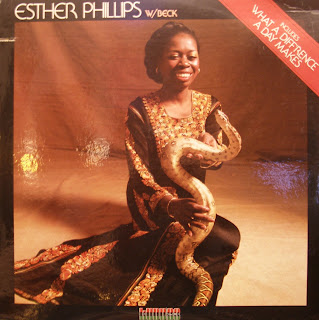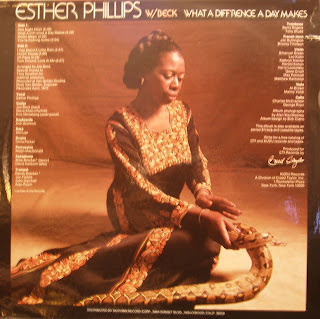 A Classic Release for lovers of unique, funk, soul and jazz records.
A Classic Release for lovers of unique, funk, soul and jazz records.
it has timeless cool all over it, from the musical arrangement, the great writing context, and most of all the dynamic and strong vocal delivery of Ms.Esther Phillips!
Tracklisting:
A1 One Night Affair (5:48)
A2 What A Diff'rence A Day Makes (4:28)
A3 Mister Magic (4:22)
A4 You're Coming Home (3:24)
B1 I Can Stand A Little Rain (3:21)
B2 Hurtin' House (5:00)
B3 Oh Papa (4:18)
B4 Turn Around, Look At Me (3:57)

Biography
Esther
Phillips recorded her first work with Johnny Otis in 1949 at the grand
age of 13 years old, then in 1950 became the youngest R&B singer to
have a #1 US R&B hit ("Double Crossing Blues"). The following year
yielded six more Top Ten R&B hits, although from 1952 success dried
up with Phillips then moving on from Johnny Otis and Savoy to new label
Lenox (and in 1962 scoring her first hit in ten years with "Release
Me"). In 1964 Lenox went bust and Phillips moved on to Atlantic
where she made some great records (including two great live albums
'Confessin' The Blues' and 'Burnin' - both with King Curtis) but
garnered little real chart success (although 'Burnin' did reach #7 on
the R&B Album charts in late 1970). Apart from a brief stint with
Roulette (1968-1970) Phillips stayed with Atlantic until joining Kudu in 1972.
By
this time (despite the occasional heroin relapse - a habit she had
picked up when with the Johnny Otis Band - which would plague her until
her death in 1984 at the age of 48), Phillips was in dynamic vocal
form, and with Pee Wee Ellis serving as arranger, released three
stunning soul albums by the end of 1973 ('From A Whisper To A Scream', 'Alone Again, Naturally', 'Black-Eyed Blues'). On
the back of these recordings Phillips garnered some serious mainstream
praise in 1974 - Rolling Stone Magazine's Best R&B Singer award,
Ebony Magazine's Best Female Blues Singer (which she one again in
1975), Downbeat Magazine praise, NAACO Image Award and a French
Academie du Jazz Award. However as the decade progressed and disco
became more prevalent (and perhaps more importantly Pee Wee Ellis was
replaced), things became slicker, and although Phillips scored her
biggest international hit single with her disco remake of Dinah
Washington's"What A Diff'rence A Day Makes",(and
Great Records with Joe Beck) by the end of 1977 Phillips had moved on
from Kudu to her own production company ESTO (and arranger Pee Wee
Ellis again).
The Reviews
1
Reading
the credits of What a Diff'rence a Day Makes, one could easily assume
that it is a jazz album. This 1975 LP was produced by Creed Taylor and
arranged by guitarist Joe Beck Esther
Phillips could have easily delivered a first-class jazz album. But What
a Diff'rence a Day Makes doesn't contain any jazz -- not even jazz-funk
or soul-jazz. It is, however, an excellent soul/disco outing. This LP
is best known for its hit title song, an inspired disco version of a
standard that has usually been heard in jazz and pre-rock pop settings.
But the song works surprisingly well as disco, and the other tracks are
equally impressive. Phillips is as soulful and convincing on the bluesy
"I Can Stand a Little Rain" as she is on Gamble Huff's "One Night
Affair" (a Philadelphia soul classic that was recorded by Jerry Butler
in 1972 and the O'Jays in 1969) and Ralph MacDonald's "Mister
Magic."The latter is the gem that Grover Washington Jr. is best
remembered for; while his famous version was instrumental jazz-funk,
Phillips' is vocal-oriented soul. It should be noted that most of the
jazz musicians who back Phillips on What a Diff'rence a Day Makes are
not jazz snobs. The Brecker Brothers and Sanborn, for example, have
done their share of RB sessions, and they would probably be the first
to tell you that this LP needs to be judged by RB standards instead of
jazz standards. And when RB standards are applied, it is easy to
conclude that What a Diff'rence a Day Makes is among Phillips' finest releases.
2
It's a strange one this it suggests R&B but turns out to be disco/Jazz. It is however a great funky 70's up beat album
which is all the more strange when you consider her personal situation,
which wasn't that good. The stand out track here is her interpretation
of "What a Difference a day makes" by Dinah Washington she funks it up
a little and it has me dancing every time I hear it.
 Main
Main